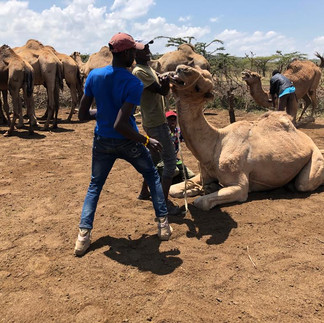I'm upside down again with my nose in a box for the last time, and it finally hits home that it's all over. Almost. The camels are saddled and on the way to a suitable spot for loading. Once they're all safely home with their handlers, we can really breathe freely and say it's over.
The long-suffering car is also loaded up and waiting to take as much luggage as possible to go on the lorries with the camels back to the Soysambu starting base. The balance is being gathered together into piles to go home.
Memories of the preparations for the trip come flooding back; the bag of dried fruit that's left over and the stress when the dehydrator gave up. Fresh produce was not going to be readily available for the three months of the safari, other than when re-supplies could get in. And that brought its own logistics - where, how and when.
These meant working out roughly from the chosen route how far and matching it to dates; co-ordinating dates with willing friends who know the various unknown to us areas, or to come on safari with us just for the jaunt; days spent pouring over maps spread across the table, with the essential magnifying glass, and deciphering names and route notes taken from these reccee drives, writing down distances as we bounced along rough bush tracks, and getting missing sections from Roisin, who knows, as the younger generation, how to work google; contacting names we'd been given by more friends to get further local information on suitable routes and places to stay, or things to see, and alternative routes to ensure we could still get through.
And this, as we discovered, was only very approximate as our distances on the ground turned into half as much again. Some sections also changed on the ground, although the general direction of south-east all the way remained steady. Fences, erosion and different places to see, or avoid, are not on the map.
Lots of number crunching goes on; how many clients, without whom we couldn't do it, and on which sections, which means how much equipment and therefore how many camels to carry it, and the food and water, and how many camel men to handle that number of camels; moving camels from home (Rumuruti, Laikipia) to Soysambu two weeks ahead to make up the right team. How many water cans would be needed to carry enough for a three-day supply for the largest number of people walking? And which camel men and guides would be suitable for the different jobs, and the areas to go through.
Lists and more lists appear; lists of suitable camels and what we needed to prepare them a month ahead of the time to start, and the luggage they were to carry. The workshop rang with the banging of nails and chatter of speculative voices as more saddles and food boxes were made, to leave enough of both for other trips. The phone buzzed as John hooked up would-be walkers, who in their turn needed to work out how, dates and timing that would suit us both; orders were sent out for more uniforms, rope, tandaruas and tents as storm warnings continued to come in; for making arrangements down the track; arranging guides and getting contacts. The car came home loaded with wholesale supplies. Lists grew for food and medical supplies for both camels and people, fresh produce for drying to reduce weight and provide a bit of variation in the diet. The dehydrator whirred all day for weeks. Lists translated into piles of what equipment was essential: water purifiers and cans, nets, how much kitchen and tableware could we get away without, Mutura and Tatty's food and transports.
The house got tighter and tighter as gradually everything came together in piles and boxes till it was one-way traffic through the house. All seems chaos, and one can only hope it comes together alright when the time comes to shift it all down to the start.
At home, we try to complete jobs to allow us time away. Our staff hold the fort during this time, and look after all our animals for us. We leave more lists and supplies for other shorter camel safaris. These and livestock sales keep the caravan moving south. And on our way south, we are watched over and protected each day by my grandfather and son's logo, our lucky scorpions.
And we were helped at every step by our friends, and our camels and the men who looked after them and us all, without whom we couldn't have done it. For them all, we thank you wholeheartedly.
























Comments